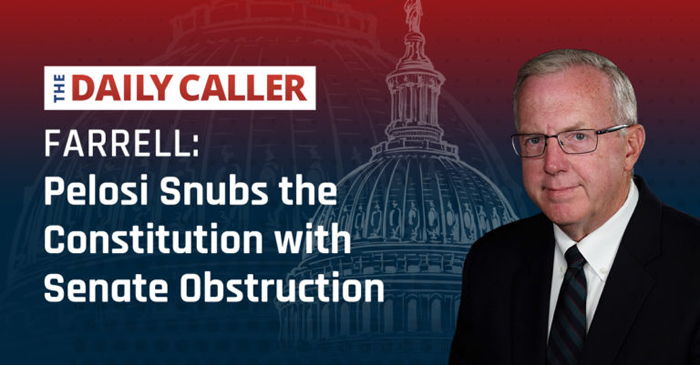By Chris Farrell Judicial Watch
House Speaker Nancy Pelosi’s decision to delay sending articles of impeachment to the Senate is not just bad politics for Democrats. It is an affront to the constitutional impeachment process.
Democrats believe that delaying sending articles of impeachment to the Senate gives them enhanced leverage over the Senate’s trial process. Pelosi seems delusional with “power,” since she is simply holding back something the Senate never wanted to deal with in the first place. Maybe she could enhance her posture by also denying senators all the nutty legislation her caucus pushes through, that’ll show ‘em!
The delay also gives time for Democrats and their allies in the press to engage in selective leaks to try to build the case that “more evidence” is needed against President Trump. Essentially, they aim to prolong the investigative phase.
This same debate over Senate process was held behind closed doors during the impeachment of President Clinton 21 years ago, when Republicans wanted to have witnesses such as Monica Lewinsky testify. In the end the Senate adopted bipartisan rules that did not allow that kind of circus atmosphere, an agreement Democrats pushed for strongly at the time and now, hypocritically, reject. In the Trump case Democrats are all for witnesses, provided their last name is not Biden. Democrats also want “biased” Republican senators recused from the trial but are content to allow Democratic presidential contenders in the Senate to sit as jurors.
Perhaps Democrats also believe they can move the needle on public opinion during the delay, which, if anything, has shifted in President Trump’s favor. In 1998, when Pelosi was arguing against Bill Clinton’s impeachment, she said she trusted “the wisdom of the American people,” who “know better, apparently, than the politicians how disruptive it would be to impeach or have a president resign.”
Pelosi’s power grab raised the intriguing issue that Donald Trump is not officially impeached, and won’t be until the indictment has been served to the Senate. The matter was discussed by an “unimpeachable” source, Harvard law professor and Democratic star impeachment witness Noah Feldman. “If the House does not communicate its impeachment to the Senate, it hasn’t actually impeached the president,” he wrote. “If the articles are not transmitted, Trump could legitimately say that he wasn’t truly impeached at all.”
To understand the history, intent and application of impeachment powers, we can turn to the Supreme Court case Nixon v. U.S. (1993), which arose over the impeachment and removal of U.S. district judge Walter L. Nixon for perjury. In its unanimous decision the court ruled that impeachment was a nonjusticiable issue (because it’s a political process — not a legal one), and placed great emphasis on the wording of the respective grants of power in Article I, sections two and three of the Constitution; the House of Representatives “shall have the sole Power of Impeachment” and the Senate the “sole Power to try all Impeachments.” These are the only “sole powers” mentioned in the document, and the high Court took the words literally.
The division between the House and Senate roles, each of which are exclusive “sole” powers, provides the check and balance. As Alexander Hamilton wrote in Federalist #66, this split “guards against the danger of persecution from the prevalency of a factious spirit in either of those branches.” In his concurring opinion, Justice Byron White, joined by Harry Blackmun, delved more deeply into the question of the House/Senate split.
He believed that the reason for the “division of labor” between the two bodies was because the Framers were “very much concerned to separate the prosecutorial from the adjudicative aspects of impeachment.” He presciently contended that it was not the judicial branch but the House of Representatives that posed “the source of potential interference with which the Framers were concerned when they employed the term ‘sole.’” Likewise, he believed that “it is equally implausible to say that the Senate is charged with ‘investigating’ impeachments given that this description would substantially overlap with the House of Representatives’ ‘sole’ power to draw up articles of impeachment.”
Pelosi, by not delivering the articles of impeachment, is attempting to break down this critical constitutional boundary. Blurring the lines between the prosecutorial and adjudicative aspects of the process for partisan, political advantage serves no cause of justice, and is detrimental to the Constitution’s design, as well as to the Founders’ desire to limit what Hamilton called “the awful discretion” to “doom” an important public figure “to honor or to infamy.”
Chris Farrell is director of investigations and research for Judicial Watch, a nonprofit watchdog group. He previously worked as a counterintelligence case officer.






